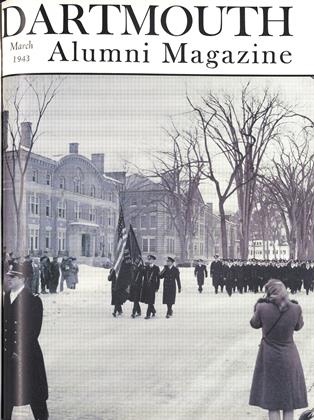The announcement recently made in many colleges, including Dartmouth, that the curriculum will continue to offer what are usually called the "liberal arts" courses for such as may be in position to pursue them, will have a reassuring effect, it is hoped, on those who have feared that in our natural eagerness to subordinate everything to the war effort there might be danger of obliterating altogether the elements in collegiate education which traditionally form the back-bone of training in American colleges generally.
Indeed a voice has been raised here and there in protest against the idea that there is something suggestive of the sissy in the liberal arts—something so incongruous with the stern business of making war that such things ought to be banned for the duration. That such an idea does exist in some quarters it is impossible to deny; but it is equally impossible to avoid the feeling that the notion is deplorably mistaken, and it should hearten the devotee of liberal education to learn that at Dartmouth and elsewhere there is no intention to go the limit of ignoring completely these lines of study, which suffer somewhat from a non-descriptive terminology.
One may well regret that there is no better general term to describe those features of college education which are non-technical and which relate more to the abstract than to the concrete. "Liberal" arts, one may assume, are arts which liberate and broaden the mind; and stress is being laid on the fact that such things, so far from being inappropriate to the fighting of a war, do as a matter of course have a direct and vital bearing, since they clarify alike what we are fighting for and what we are fighting against. Beyond doubt the exigency of the time calls for unusual emphasis on the directly technical training of young men on whom falls the pressing business of making our war effort success ful. Beyond doubt both the numbers free to devote themselves to "cultural" studies and the opportunity to set them forth have suffered curtailment through the pressure of inexorable circumstance.
It does not follow that the eclipse must be total, still less permanent. Indeed, if it were so, that would be a positive detriment to the war effort itself. War is a horrible and destructive business; but there lies under it all'an ideal which men feel it justifiable to give their all, even life itself, to preserve. It is to this ideal that liberal education devotes itself; and the service of that ideal is of primary importance, not only in this time of war-making, but also in the post-war world.
Never forget that what we are witnessing is a battle to the death between two opposing systems of philosophy—the sordid one of the totalitarian cynics, and the one which bases itself squarely on the infinite worth of the individual man, endowed by his Creator with certain "unalienable" rights open equally to all from birth. Whatever intensifies devotion to that latter ideal, and whatever makes clearer the ideal itself, is of service to the cause of the United Nations. It may not instruct young men in the arts of the sapper and miner. It may not teach them how to guide a plane, operate a gun turret, or build and navigate a ship. But if you assume that therefore it is of no value to an America engaged in warfare, you reckon without your host.
Liberal education will survive, and it isn't even going into a transitory oblivion. Let's keep it firmly in mind that it is con- cerned with the underlying bases, the eternal verities, the quintessential reasons why we are at war. It deals with the vital essence of our humanistic creed, the warp and woof of our civilization. There has been altogether too much talk about the liberal arts as if they were a sort of icing on the cake, or a fancy frill without which men would be quite as well off, and per- haps better. Man doth not live by bread alone, and it may be well if we remind ourselves of that fact.
DARTMOUTH IN THE SOUTH PACIFIC Standing, left to right: Capt. A. H. Dearing USN 'l4, Comdr. G. Markey USNR 'lB, Lt.Comdr. S. E. Ellis USNR '24, Lieut. B. F. Jones USNR '25, Pfc. D. H. Howe USA '3l. Front row: Lt. (jg) P. L. Dostal USNR '4O, Lt. (jg) S. W. Graydon USNR '4O, Lt. (jg) L. A.Valier Jr., USNR '37, 2nd Lt. E. F. Cogswell USA '29.Comdr. Gene Markey 'lB wrote of the above: "Here is a handsome photograph of agroup of Dartmouth sailormen—with one or two soldiers throwji in (proving that thereare soldiers in this area) on an island "adjacent to the Solomons." Missing from thepicture is Comdr. Ben Tenney (MC) USNR '22, who was at sea."
 View Full Issue
View Full Issue
More From This Issue
-
 Article
Article'Round the Girdled Earth
March 1943 By Dartmouth -
 Article
ArticlePresident Explains Navy Relations
March 1943 -
 Class Notes
Class Notes1918*
March 1943 By ERNEST H. EARLEY -
 Article
ArticleColleges Will Help Army Training Program
March 1943 By WILBUR C. MUNNECKE '27 -
 Class Notes
Class Notes1923*
March 1943 By SHERMAN BALDWIN -
 Class Notes
Class Notes1932*
March 1943 By CARLOS H. BAKER
P. S. M.
-
 Article
ArticleEducation for the Submerged
December 1942 By P. S. M. -
 Article
ArticleWhy Pick on Friday?
January 1943 By P. S. M. -
 Article
ArticleSacrifice Always Hurts
April 1943 By P. S. M. -
 Article
ArticleThe War and After
May 1943 By P. S. M. -
 Article
ArticleHistory Again
February 1944 By P. S. M. -
 Article
ArticleMilitary Training
November 1944 By P. S. M.







